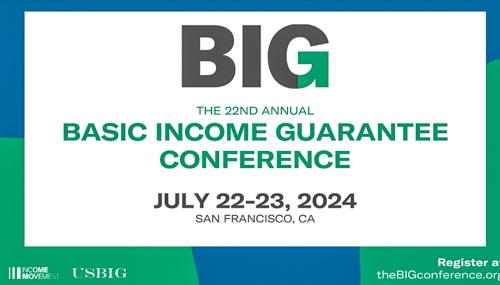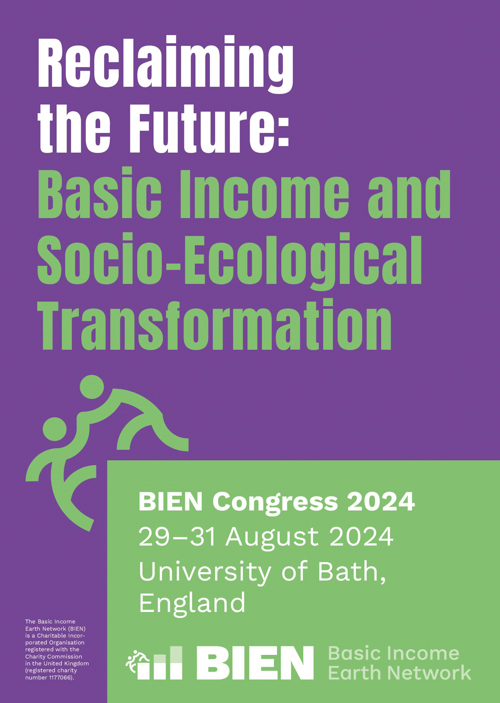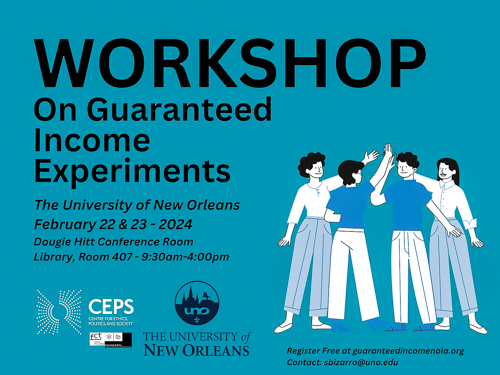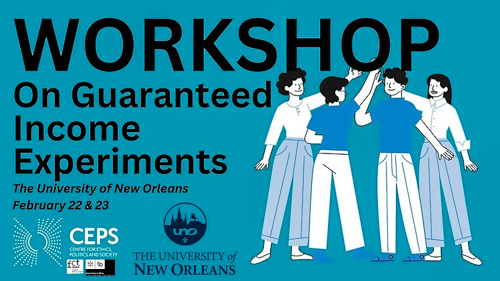
by Peter Knight | Apr 3, 2024 | Events, News
“The Basic Income Guarantee Conference (BIG!) is the only annual conference in the U.S. focused on building and supporting the thriving basic income movement as we drive towards national policy. The BIG Conference is a BIG TENT event that includes pilot participants, policy analysts, pilot administrators, community based organizations, activists, artists, researchers and more as we share wins and best practices and find opportunities for collaboration across existing efforts and coordinate for state and national level campaigns. This year’s BIG programming is co-designed by over 200 individuals. Sessions will focus on topics prioritized by the community, including: paying for and scaling existing programs with public funds, developing post-pilot strategies across the pillars of the movement, building the base via community centered practices, intersectional justice work and the role of basic income in some of the most pressing issues of our time, including climate change and AI proliferation.”
Read more and purchase tickets by clicking here.

by Peter Knight | Mar 15, 2024 | Events, News
“BIEN 2024 is focused on basic income’s potential as a tool for social transformation towards an economically just, politically inclusive and ecologically sustainable world. The Congress theme is thus about constructing a transformative vision of society – built on the principles of universal sufficiency, social and distributive justice, inclusion, care, and ecological sustainability – and exploring the role of basic income in that vision, and the best strategies to achieve it. See full description of the theme of the Congress here.
How to submit?
To propose a paper or presentation, please fill in the form here. The deadline for submissions is the 15th of April 2024. In case of any queries, write to biencongress2024@gmail.com. “

by Guest Contributor | Jan 9, 2024 | Events, News
“This workshop is presented by the History and Philosophy Department of the University of New Orleans in collaboration with the Centre for Ethics, Politics and Society, at the University of Minho, and the Justice Studies Program at the University of New Orleans. It will be held at the University of New Orleans, February 22-23, 2024 at the Dougie Hitt Conference Room, at the Library, room 407, 2000 Lakeshore Dr, New Orleans, LA 70148.
The workshop is organized by Sara Bizarro (University of New Orleans) and Roberto Merrill (UBIECO project at the Centre for Ethics, Politics and Society/University of Minho).”
Read about the speakers and solicited paper topics here.

by Guest Contributor | Nov 25, 2023 | News
“Basic income is one of the necessary components of a global, national and regional policy
mix for socio-ecological transformation”, say Ronald Blaschke from Germany and Min Geum
금민 from South Korea. Their memorandum “Basic income as a necessary component of a socio-ecological transformation and key element for climate justice” was first presented at
BIEN’s 2023 congress in Seoul, South Korea, and has gained support by over thirty
organizations and many UBI advocates worldwide. The authors are still looking for more
supporters to join them in their call for a Basic Income addressing climate change.
Signatures can be sent to blaschke@grundeinkommen.de. The full text can be found here.

by Peter Knight | Nov 4, 2023 | News
Image credit: Canva https://www.canva.com/policies/free-media-license-agreement-2022-01-03/
“This workshop is presented by the History and Philosophy Department of the University of New Orleans in collaboration with the Centre for Ethics, Politics and Society, at the University of Minho, and the Justice Studies Program at the University of New Orleans. It will be held at the University of New Orleans, February 22-23, 2024 at the Dougie Hitt Conference Room, at the Library, room 407, 2000 Lakeshore Dr, New Orleans, LA 70148.
The workshop is organized by Sara Bizarro (University of New Orleans) and Roberto Merrill (UBIECO project at the Centre for Ethics, Politics and Society/University of Minho).” Read more:






